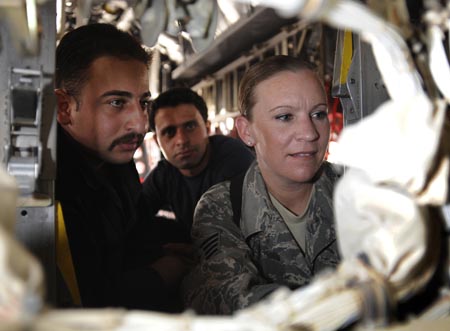 Airmen with the 321st Air Expeditionary Advisory Squadron at New al Muthana AB, Iraq, are seeing progress in the abilities of the Iraqi Air Force members whom they are training to maintain their nascent air arm’s C-130 transports. “I see better aircraft and I really see them being competent and able to keep them flying safely,” said TSgt. William Kusar, aircraft structural maintenance and metals technician advisor with the squadron. Kusar noted, for one example, that his students have “overcome a barrier” and now understand the benefit of using precision machinery on the aircraft in place of hand tools, which were their only option in the past. Although the 321st AEAS will soon be deactivated, some of its airmen will stay on to ensure that the Iraqis are trained up to the desired skill levels. (New al Muthana report by SrA. Alyssa C. Miles)
Airmen with the 321st Air Expeditionary Advisory Squadron at New al Muthana AB, Iraq, are seeing progress in the abilities of the Iraqi Air Force members whom they are training to maintain their nascent air arm’s C-130 transports. “I see better aircraft and I really see them being competent and able to keep them flying safely,” said TSgt. William Kusar, aircraft structural maintenance and metals technician advisor with the squadron. Kusar noted, for one example, that his students have “overcome a barrier” and now understand the benefit of using precision machinery on the aircraft in place of hand tools, which were their only option in the past. Although the 321st AEAS will soon be deactivated, some of its airmen will stay on to ensure that the Iraqis are trained up to the desired skill levels. (New al Muthana report by SrA. Alyssa C. Miles)
F-35As from the Vermont Air National Guard have deployed to Puerto Rico in recent days, continuing a major buildup of U.S. Air Force assets in Latin America aimed at combating drug trafficking and pressuring the regime of Venezuelan leader Nicolas Maduro.

